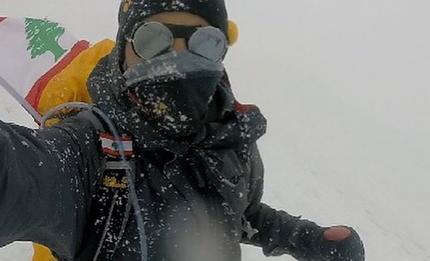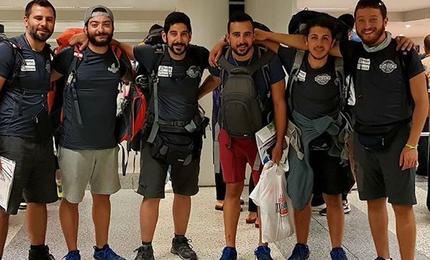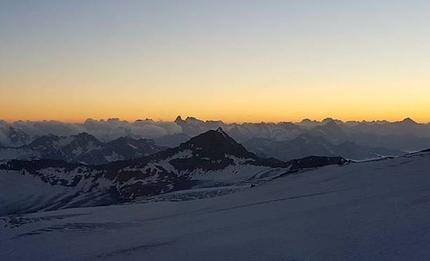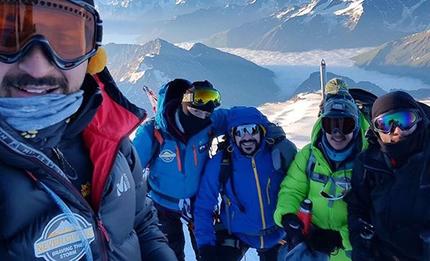They made it to the summit of Europe
LAU’s Survival Team reaches the top of Mount Elbrus and the hearts of children with cancer.
 Click to view 4 photos
Click to view 4 photos
Associate Manager of Byblos Campus Activities and Survival Team leader Alan Kairouz.
On their second “Never Give Up” Expedition, six members of LAU’s Survival Team last week returned to Lebanon from Russia, where they had climbed up to the highest peak in Europe, Mount Elbrus. “It was much tougher than last time,” says Associate Manager of Byblos Campus Activities and Survival Team leader Alan Kairouz, referring to the team’s climb of Mount Kilimanjaro in 2015. “This climb was more technical and temperatures fluctuated between minus 20 and plus 30 degrees Celsius.”
Half of this year’s climbers had also participated in the Kilimanjaro adventure, in support of LAU’s groundbreaking exoskeleton engineering project. This year, the Survival Team chose to support children with cancer being treated at the LAU Medical Center-Rizk Hospital.
“The best tool to fight cancer is a positive attitude, and a motivation and will to survive and fight on. So, we decided to be a source of motivation for the children,” explains Kairouz. He and his fellow climbers sent personalized video messages, almost daily, from the mountain trail to four children at the hospital.
“The kids loved the messages. They made them feel happy and encouraged them to continue their treatment,” says pediatric oncologist Dr. Roula Farah, who delivered the messages to her patients, aged between 8 and 12. “At this age, such show of strength and connection can really motivate them,” she says, adding that an important and additional benefit of the climb was the awareness it raised.
“We raise funds to support the treatment of children with cancer, and so all initiatives that help us do so are most welcome,” adds Farah, who is also the president of Chance, an association founded at the hospital 15 years ago to help fund treatment of children with cancer.
“Everybody has a mountain to climb. We had this mountain, the children have their own mountain, and we were fighting together hand in hand,” says Kairouz of the bond that formed between climbers and children. “When one of us felt ready to give up, the children’s memory was our motivation to keep going,” he adds, explaining why he wouldn’t consider climbing without a cause. “It’s a two-way support.”
“Also this expedition wouldn’t have been possible without the generous support of the university. Its provision and encouragement made it easy for the team to train, properly prepare and achieve its goals,” Kairouz says.
A special diet and exercise became a daily routine. The team trained for several months in harsh terrain and weather conditions. “We would train almost daily at the gym, but we would also go to the Cedars during stormy weather to acclimatize to altitude and harsh conditions,” explains Kairouz, who faced cold winds of up to 60km per hour in Russia.
Highlighting the value of teamwork and collaboration, Kairouz recalls other people and departments within the university that helped in the run up to the climb. The Medical Student Association Club, for example, helped provide physical tests for the team at the LAU Medical Center-Rizk Hospital; the Nutrition Club supplied the climbers with meal plans; members of architecture and design developed the visuals; the website was built by students at the Computer Science department; and the Development office helped attract sponsors, who gave discounts on equipment and air travel.
“Just as sedimentary plates pushing against one another grow to form mountains, we, by pushing one another to success, grow together,” says Kairouz, happy to be back and proud of his team’s achievement. “Tears at the peak flowed, because we achieved what we set out to do, hence motivated the little ones to push on and Never Give Up.”
Want to join the Survival Team, or offer your support ahead of their next climb? Contact Alan Kairouz at the Dean of Students’ office.
More
Latest Stories
- Six LAU Faculty Listed Among the World’s Top 0.05 Percent by ScholarGPS
- Lebanon’s Brightest Compete for LAU Engineering Scholarships
- This Summer: Robotics and Artificial Intelligence Summer School for Middle Schoolers
- Into the Psychology of Justice
- Alumnus Zak Kassas on Navigation, Spoofing and the Future of GPS
- Hearing Between the Lines
- LAU Hematology Conference 2025: Advancing Science Through Interdisciplinary Exchange
- Dr. Chaouki T. Abdallah Invested as LAU’s 10th President




